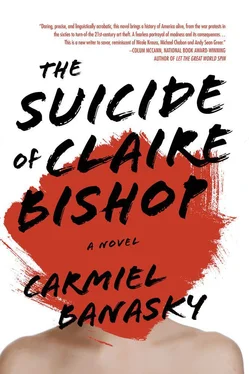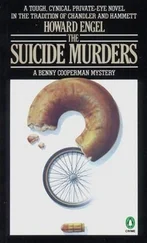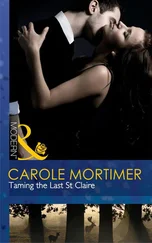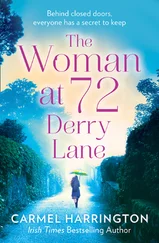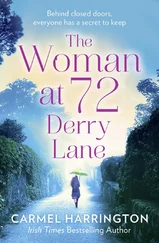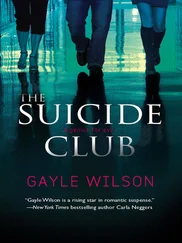“I can always count on you—”
“To be honest? Yes. And happy birthday,” Mary said, kissing Claire’s cheek before they started walking again. “Your thirtieth.”
“Thirty-fifth,” Claire said.
“Shh.”
The wind ripped through their coats and they laughed at it. Claire hadn’t laughed in so long; she almost forgot she was upset. Mary was a giddy drunk. She said she felt like taking off her shoes and skipping, but she didn’t. She put her arm around Claire and squeezed her shoulder and Claire felt like crying.
The gallery was on the ground floor of a loft on Tenth Street. The people spilled out onto the sidewalk, swimming in a pool of yellow light. Claire was overdressed, she could see that immediately. Most of the men were in jeans or trousers — the women too. Claire was surprised, though she tried very hard not to be, by how many American Negroes were present at an art gallery. “This is quite the eclectic crowd,” she said to Mary.
“Oh, Claire! I can’t take you anywhere.” Mary guided Claire inside by her forearm, then immediately recognized someone and flagged him down, leaving Claire alone.
The gallery was crowded and everyone looked horrible in the bright light. Sheets of stiff, semitransparent plastic hung from the rafters like laundry, sectioned so they formed smaller rooms. Red, yellow, and green paint was scratched across the mock walls. The word Fluxus rotated around her, painted or scribbled along every surface. Plastic fruit littered the ground. She stepped over fake bananas and kiwis to get to the drinks in the back. Just a glass or two of the sweet brandy punch. She poured generously.
Rows of folding cane chairs faced a screen in the front of the room. Projected on the screen were the words Escape Velocity. Big, black block letters. The words sounded like a magic incantation to Claire. A code to nothing, yet Claire wanted it. She wanted to own those words and use them, do something terrible to them.
She downed her punch.
At the corner of the table, tacky cocktail forks were spread beside a plate of cheese loaf and celery stalks. Claire looked around. Then she slipped a fork into her purse. At that moment, the music rose. She started, felt she’d been caught.
“You look lost.”
Claire turned to find a man a decade younger than she and a full head taller staring down at her eagerly. Acne scarred his upper lip, which he tried to hide with a thin moustache, but he had a confident air.
“I’m not going anywhere,” Claire said. “How could I be lost?”
“May I?” He gestured toward her empty cup, and she handed it to him. “Are you an artist?” he asked. “It seems like everyone here is.”
“Yes,” Claire said quickly. “Or, I used to work in film. But I gave it up.” It was not hard to lie to this man she’d never see again. And she had, years ago, appeared in one film.
“Why’s that?” He filled her glass and handed it back.
“Oh, a number of reasons. This painter I know thinks I want to jump off a bridge.” She sipped her punch quickly.
“Thrilling. Don’t you? Most people I know do,” said the man.
“That’s awfully flippant,” Claire said.
“You’re right,” he said. “It’s no laughing matter.”
“Do you? Want to jump off a bridge?” she asked, cup half empty.
“Sometimes.” The music rose and he had to lean in close to her ear to speak. “Perhaps this is an odd question, but did I see you put a fork in your bag? I’m just curious.”
“That.” Claire felt herself blushing furiously. “That is for an art project.”
He had a kind smile. “I thought you’d given up on all that.”
Something was about to begin, it was brewing in the air. She quickly poured herself a third glass of punch before the man walked her to Mary, who’d saved her seat, but there was no free chair nearby for him. It was a relief to see him go. What a stupid thing, her forks. What a lie. And not only what she’d said to the man. She felt embarrassed of herself in front of herself.
Mary had called this night a Happening . “Visual poetry,” she’d said. Over a hundred expectant faces surrounded them, and more people were milling in, late and chairless. The crowd was still rustling and mumbling when a woman in the front started reading in a loud monotone. “A Hart Crane poem,” Mary said. A woman dressed all in black and wrapped messily head to toe in white gauze bandages stood up from the middle of the audience. She also started yelling the poem loudly, competing with the other woman. A third player yelled at the spectators to take the programs from beneath their seats: they were to do as their card said when a bell was rung. Claire’s card had a different number than Mary’s but Claire did not tell her so. She followed her friend like a child. She was too old for this. And overdressed. She stumbled over a chair leg. The chattering of the crowd, shouts of the performers, music clawing its way out from a radio — each noise continued to cover itself with another, layer after layer.
She scurried to refill her cup — the punch was very easy to drink — before men in butcher jackets covered in fake blood ushered them around the gallery. Others wore football helmets and tried to sell them bottles of water owned by the US government. Astronauts danced the hokey pokey. Someone yelled, “Duck and cover, the bombs are falling, duck and cover!” It became a song, a chorus lilting over the mock walls. And they ducked, people were actually ducking and covering all over the place. Something pulled at the hem of Claire’s skirt, it was Mary on the floor, grinning, and Claire knelt, too, but not all the way, and tried to smile, bent her arms around her head.
Above the noise, above all that current, Claire heard a name. Whipping around, searching the crowd, the confusion of faces, desperate. Nicolette. Why hadn’t she thought of it before? Of course Nicolette would come to an event like this. She was everywhere.
And then there were chicken feathers falling through the air — hundreds and hundreds of chicken feathers. They fell on her hair, her dress, on her wool coat that she’d draped over a chair somewhere. She tried to brush them off. But they wouldn’t unstick themselves, each feather coated in a drop of glue. A foot away, a woman popped, popped, popped open umbrellas. One flew open right beside Claire, swiping her cheek. Someone laughed.
Claire pushed her way to her coat, her cheek burning. She could hardly see the exit through the crowd spinning around. Her chest rubbed against strangers’ backs, her back against their chests.
Outside, in the streetlight, she tried to pluck away the fluff, but it only stuck to her fingers. And that’s how she walked home — covered in chicken feathers.
She trudged nearly twenty blocks in the new cold, the smell of damp wrought iron and Sunday garbage cooling. She’d have to explain her abrupt departure to Mary, but she’d worry about what to say tomorrow. Claire could hear herself clicking down the pavement. Then, a heel caught between cobblestones. She stumbled forward. People might think she was drunk. She was. It made her feel vulnerable. The streetlights hummed, accompanying her home, except for the dark corner of Eighth Street and Fifth Avenue — had it burned out or was there never any light? She looked around, expecting every shadow to morph into a predator. She held her bag tightly. There were footsteps behind her, but when she turned, there was no one.
Safe in her elevator, she remembered Freddie for the first time that night. He would be home by now. They hadn’t seen much of each other since the painting. And she missed him. Did she miss him? She avoided him at home now, running errands in the evening so she was gone when he came back from work. He said he was coming down with something, wasn’t feeling himself. She was afraid he’d be too sick to go to the office and would be home all day.
Читать дальше
